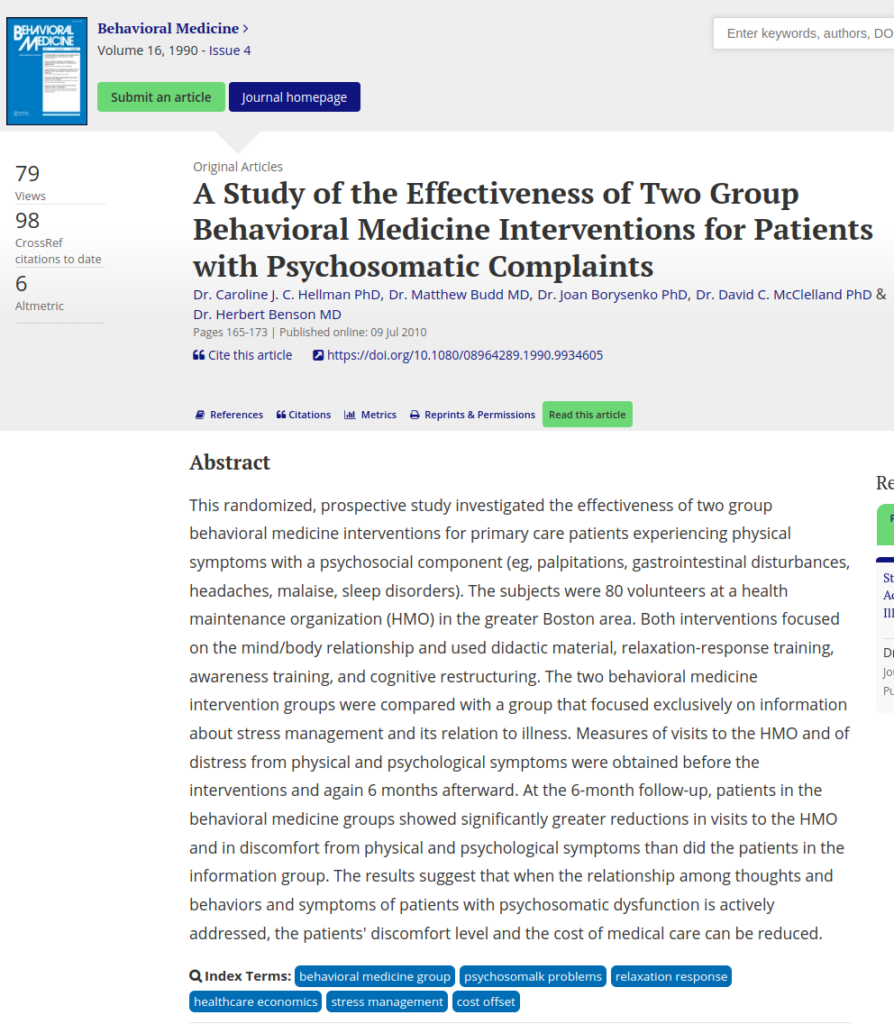This randomized, prospective study investigated the effectiveness of two group behavioral medicine interventions for primary care patients experiencing physical symptoms with a psychosocial component (eg, palpitations, gastrointestinal disturbances, headaches, malaise, sleep disorders). The subjects were 80 volunteers at a health maintenance organization (HMO) in the greater Boston area. Both interventions focused on the mind/body relationship and used didactic material, relaxation-response training, awareness training, and cognitive restructuring. The two behavioral medicine intervention groups were compared with a group that focused exclusively on information about stress management and its relation to illness. Measures of visits to the HMO and of distress from physical and psychological symptoms were obtained before the interventions and again 6 months afterward. At the 6-month follow-up, patients in the behavioral medicine groups showed significantly greater reductions in visits to the HMO and in discomfort from physical and psychological symptoms than did the patients in the information group. The results suggest that when the relationship among thoughts and behaviors and symptoms of patients with psychosomatic dysfunction is actively addressed, the patients’ discomfort level and the cost of medical care can be reduced.
A Study of the Effectiveness of Two Group Behavioral Medicine Interventions for Patients with Psychosomatic Complaints
Publication
Behavioral Medicine
Volume 16, 1990 - Issue 4
Abstract
Web and Email Links
Related Listings
Journal
International Journal of Cardiology
We report extremely prominent heart rate oscillations associated with slow breathing during specific traditional forms of Chinese Chi and Kundalini Yoga meditation techniques in healthy young adults. We applied both spectral analysis and a novel analytic technique based on the Hilbert transform to quantify these heart rate dynamics. The amplitude of these oscillations during meditation was significantly greater than in the pre-meditation control state and also in three non-meditation […]
Journal
Psychosomatic Medicine
Oxygen consumption, carbon dioxide production, and respiratory rate are significantly decreased during the practice of a new, easily-learned relaxation technique. The elements of the technique are a mental device to prevent distracting thoughts, a passive attitude, decreased muscle tonus, and a quiet environment which is as free of visual and auditory stimuli as possible. Sitting quietly with the eyes either open or closed failed to produce the same changes. These physiologic changes […]
Journal
Obstet Gynecol
During a 5-month study, we examined the effects of the relaxation response on premenstrual syndrome in 46 women who were randomly assigned to one of three groups: a charting group, a reading group, and a relaxation response group. The relaxation response group showed significantly greater improvement than the charting and the reading groups on physical symptoms (P less than .025 for both comparisons). There was a significant group-by-severity effect for charting versus relaxation resp […]

